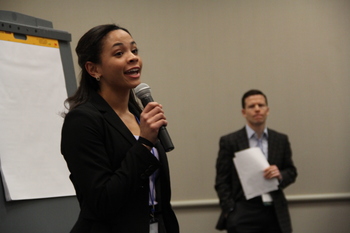
Governor Rick Snyder's economic summit brought business leaders and economic development professionals together to brainstorm solutions for some of the state's most pressing issues.
Ben Freed | AnnArbor.com
Ann Arbor was well represented in Detroit Monday and Tuesday by business and economic development leaders. Here are five messages they should be bringing back to the business community to help us move forward in the coming year.
1. There is major progress that must be made in connecting talent with jobs
As we heard time and again at the summit, there are jobs that need to be filled, and there are talented people who need jobs. Unsurprisingly, there is work that needs to be done on both sides of the equation.
Employers and job seekers both often have expectations that are too high, and neither has proven particularly adept at initiating the face-to-face contact that is so necessary to matching the right person with the right position.
The most sought-after skills listed by the business leaders at the conference were “soft” skills like problem solving, critical thinking, and project management abilities. However, too many companies rely on human resources software programs to sort through resumes and determine the “best candidates for jobs."

Erin Benjamin, a Hillsdale College senior from Chelsea, was one of 21 students who attended the conference to showcase the state's young talent looking for jobs.
Ben Freed | AnnArbor.com
“It could be that 500 of those resume applicants were ‘problem solvers’ but that’s a tough skill for a computer program to catch. It’s not easily quantifiable.”
In his closing address, Gov. Rick Snyder told the crowd that businesses must begin to look at future employees the same way they look at customers.
“You have to go to them, you have to discover them, and you have to engage them,” he said.
2. We should learn from the companies that have cracked the code
“Some companies don’t have any problem finding the right people for their jobs,” Ann Arbor SPARK CEO Paul Krutko said. “But others do.”
There are certain local companies and even industries as a whole that have managed to figure out ways to immunize themselves from any real or perceived talent shortages that exist in the area. Many of those companies combine aggressive personnel recruiting with personal branding that makes them a desirable destination for job seekers.
“We have created a pipeline of talent by creating connections with the education system from the higher education level down to the middle school level,” Menlo Innovations CEO Rich Sheridan said.
Sheridan’s company rarely has difficulties in finding people to fill open jobs. He uses a system similar to the one employed by the financial and consulting industries that places a premium on personal interaction with perspective employees and a recruitment emphasis on culture, attitude, and drive.
3. Bubbles are transparent

A map created by Virtual Ink shows the interconnectedness of Michigan's economy.
Ben Freed | AnnArbor.com
At the conference however, the Ann Arbor delegation was not given a separate room for discussions or planning. Our business leaders were not set aside to work on their own problems or even put on a pedestal to preach our local successes.
“Working as a region, and with other people in the same industries as we are in across the state, you’re really able to see how we all face similar issues,” University Music Society education manager Omari Rush said.
Krutko also said that associating more with the rest of the state does not mean that you're competing with the rest of the state.
"We're not really competing with Grand Rapids and Detroit, we want them to succeed because it helps us compete with places like Boulder, Austin, and Seattle," he said.
4. Being on lists is important
It’s been well documented that Ann Arbor has made a number of national “top ten” lists for everything from quality of food to quality of retirement options. We often scoff at these lists, but for young talented college graduates, finding a place is often as important as finding a job.

One area where Ann Arbor is ahead of the game is in pairing innovation with entrepreneurship. The University of Michigan Office of Technology Transfer, the U-M Center for Entrepreneurship, startup incubators like Tech Brewery, and the I-Corp program are all prime examples.
Ben Freed | AnnArbor.com
Rush said his primary concern is making sure that the state funds programs that make Michigan more culturally attractive to young people and not just focus on the jobs themselves. For Krutko, PlaceMaking is a combination of culture and employment opportunity.
“We’re reaching a tipping point in which people not living in our community will see that they can have a serial career in Ann Arbor,” he said.
“Creating a cluster of good companies creates positive culture, but it also means that you don’t move here just for one job, but you come here knowing that if that job doesn’t work out, you won’t have to move on, there will be something else here for you.”
5. This is only the beginning
There is not going to be an immediate hiring spree following the summit, and students will not all of a sudden want to move into downtown Detroit or Ann Arbor.
“Really, we’ve just created a lot more work for ourselves,” Michigan Economic Development Coordinator Mike Finney said at the end of the conference.
“But now that we have more direction and input from the business community we can do better work that will really make a difference.”
At the end of the summit, the governor told the assembled business leaders that not only do they have to look at potential employees as customers, but they must start to view themselves as customers of the education system as well.
“And I invite you all to join me at the education summit that I’m holding next month,” he said, referring to the annual Governor’s Education Summit that will be held in April.
The summit did not solve every problem plaguing the state’s economy, but it did address a number of them and reframed some conversations about talent that could have lasting implications.
“I think you heard a real call to action here from the business community to itself,” MEDC vice president of talent enhancement Amy Cell said.
“Taking ownership of these issues is the first step and we’re going to have to keep the momentum we’ve stared here to keep our state moving in the right direction.”
Ben Freed covers business for AnnArbor.com. You can sign up here to receive Business Review updates every week. Reach out to Ben at 734-623-2528 or email him at benfreed@annarbor.com. Follow him on twitter @BFreedinA2